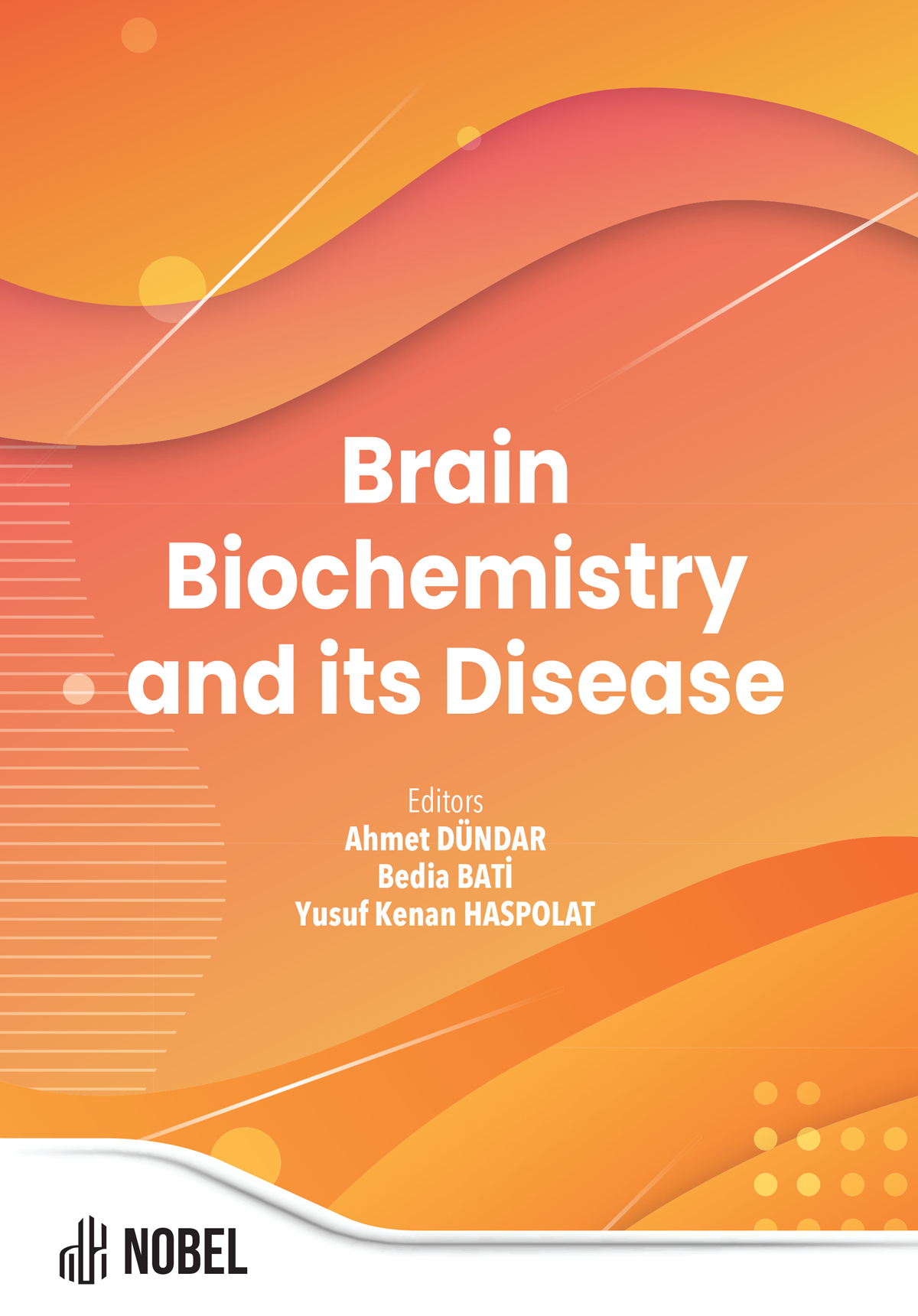Brain and Carbohydrate Metabolism
Mehmet Cavusoglu (Author)
Release Date: 2024-06-12
The brain is one of the active organs of the body in terms of energy consumption. The areas where energy is used in the brain can be listed as events such as regulating the ion concentration of nerve cells during information transfer, electrical conduction, active uptake, and synthesis of excitatory neurotransmitters. The brain uses glucose [...]
Media Type
Buy from
Price may vary by retailers
| Work Type | Book Chapter |
|---|---|
| Published in | Brain Biochemistry and Its Disease |
| First Page | 167 |
| Last Page | 180 |
| DOI | https://doi.org/10.69860/nobel.9786053359371.10 |
| Page Count | 14 |
| Copyright Holder | Nobel Tıp Kitabevleri |
| License | https://nobelpub.com/publish-with-us/copyright-and-licensing |
Mehmet Cavusoglu (Author)
Mardin Artuklu University
https://orcid.org/0000-0002-8871-5646
3Dr. Mehmet CAVUSOGLU completed his undergraduate education in chemistry at Fırat University, his master’s degree in Kilis 7 Aralik University, and his doctorate degree in Chemistry (Biochemistry) at Dicle University. I have been actively working as a Lecturer at Mardin Artuklu University Vocational School of Health Services since 2017.
Harvey RA and Ferrier DR. Lippincott’s illustrated reviews: biochemistry. Lippincott Williams & Wilkins. 2017
Nelson DL, Lehninger AL, and Cox MM. Lehninger principles of biochemistry. Macmillan. 2008
Altınsoy C, and Dikmen D. Kan Beyin Bariyeri Modülasyonuna Yeni Bir Bakış Açısı: Beslenme ve Çevresel Faktörlerin Etkisi. İzmir Katip Çelebi Üniversitesi Sağlık Bilimleri Fakültesi Dergisi. 2023; 8(1), 183-192
Sweeney MD, Sagare AP, Zlokovic BV. Blood–brain barrier breakdown in Alzheimer disease and other neurodegenerative disorders. Nat Rev Neurol. 2018;14(3):133-150
Morgan GE, Mikhail MS, Murray MJ, and Cuhruk H. Nörofizyoloji ve Anesteziyoloji in Klinik anesteziyoloji. Güneş Tıp Kitabevleri. 2008; 552-66
Demirci H. Travmatik Beyin Hasarında Beyin Metabolizması, Türk Nöroşir Derg 2020; 30(2):173-177
Barros LF, Brown A, and Swanson RA. G lia in brain energy metabolism: A perspective. Glia. 2018; 66(6), 1134-1137
Kety SS. The genral metabolism of the brain in vivo. In: D Richter, editor. Metabolism of the nervous system. London: Peramon. 1957; pp (221–237)
Tunalı G. Beyin Enerji Metabolizması. Ondokuzmayıs Tıp Dergisi. 1983; 2:83
Belanger M, Allaman I, and Magistretti PJ. Brain energy metabolism: focus on astrocyte-neuron metabolic cooperation. Cell metabolism. 2011; 14(6), 724-738
Tun K, Silav G, Çağlar Uğur H, ve Ünlü A, Serebral Metabolizma. Ankara Üniversitesi Tıp Fakültesi Mecmuası. 2001; 54(1)
Allaman I, and Magistretti P.J. Brain energy metabolism. In Fundamental Neuroscience, L.R. Squire, D. Berg, F.E. Bloom, S. du Lac, A. Ghosh, and N.C. Spitzer, eds. (San Diego: Academic Press). 2013; pp. 261–284
Magistretti PJ, and Allaman I. A cellular perspective on brain energy metabolism and functional imaging. Neuron. 2015; 86(4), 883-901
Schönfeld P, & Reiser G. Why does brain metabolism not favor burning of fatty acids to provide energy?-Reflections on disadvantages of the use of free fatty acids as fuel for brain. Journal of Cerebral Blood Flow & Metabolism. 2013; 33(10), 1493-1499
Murray K, Rodwell V, Bender D, Botham KM, Weil PA, & Kennelly PJ. Harper's illustrated biochemistry. 28. Citeseer, New York, United States. 2009.21
Sokoloff L. The brain as a chemical machine. Progress in brain research. 1992; 94, 19-33.
Hevor TK. Some aspects of carbohydrate metabolism in the brain. Biochimie. 1994; 76(2), 111-120
McKenna MC, Dienel GA, Sonnewald U, Waagepetersen HS, & Schousboe A. Energy metabolism of the brain. In Basic neurochemistry. Academic Press. 2012; pp. 200-231
Vannucci RC, & Vannucci SJ. Glucose metabolism in the developing brain. In Seminars in perinatology. WB Saunders. 2000; 24(2), pp. 107-115
Benarroch EE. Brain glucose transporters: implications for neurologic disease. Neurology. 2014; 82(15), 1374-1379
Jensen NJ, Wodschow HZ, Nilsson M, & Rungby J. Effects of ketone bodies on brain metabolism and function in neurodegenerative diseases. International journal of molecular sciences. 2020; 21(22), 8767.
Oyarzabal A, & Marin‐Valencia I. Synaptic energy metabolism and neuronal excitability, in sickness and health. Journal of Inherited Metabolic Disease. 2019; 42(2), 220-236
Guzmán M, & Blázquez C. Ketone body synthesis in the brain: possible neuroprotective effects. Prostaglandins, leukotrienes and essential fatty acids. 2004; 70(3), 287-292
| onix_3.0::thoth | Thoth ONIX 3.0 |
|---|---|
| onix_3.0::project_muse | Project MUSE ONIX 3.0 |
| onix_3.0::oapen | OAPEN ONIX 3.0 |
| onix_3.0::jstor | JSTOR ONIX 3.0 |
| onix_3.0::google_books | Google Books ONIX 3.0 |
| onix_3.0::overdrive | OverDrive ONIX 3.0 |
| onix_2.1::ebsco_host | EBSCO Host ONIX 2.1 |
| csv::thoth | Thoth CSV |
| json::thoth | Thoth JSON |
| kbart::oclc | OCLC KBART |
| bibtex::thoth | Thoth BibTeX |
| doideposit::crossref | CrossRef DOI deposit |
| onix_2.1::proquest_ebrary | ProQuest Ebrary ONIX 2.1 |
| marc21record::thoth | Thoth MARC 21 Record |
| marc21markup::thoth | Thoth MARC 21 Markup |
| marc21xml::thoth | Thoth MARC 21 XML |

